Photographs: Kind courtesy, inclusion.in
He is one of the most sought after officers who enjoys the trust of his seniors. He greatly contributed in the making of the Budget 2012-2013. He is, also, on the board of Reserve Bank of India and Life Insurance Corporation.
In an exclusive interview with Sheela Bhatt, Gopalan replies back to the critics of the Budget presented by Finance Minister Pranab Mukherjee.
On the Budget getting 'mixed' response
Budgets, always, have something for some people, it can't be that the Budget will have everything for everybody. That would be an ideal situation, no doubt, but for this to happen both inflation and current account deficit has to be very low.
But, look at the real situation. We had to decide how we can reduce the fiscal deficit of our Budget. Our prime focus was how to achieve fiscal consolidation.
Second issue before us was how to achieve growth. We are following the growth curve which was once 8.4% and now it has come down to 6.9 per cent.
Third thing on our mind was inflation. In the last 20 months inflation had been very high. It has come down substantially. But, we will have to see that inflation remains at a tolerable level.
These three were our objectives while making the Budget. In the process many issues came to the fore -- for sustainable growth we need good government spending; we also need financial, human, investment and credit infrastructure to boost growth of infrastructure.
This budget has taken a step in that direction in a very big way. We have taken care of fiscal deficit. We have taken a difficult path of bringing down the deficit level at 5.9 per cent this year against 5.1 per cent next year. We have increased gross budgetary support by 18 per cent.
Please see the point of expenditures. Most importantly agriculture, irrigation, education and health...each of these sectors will get 18 per cent plus budgetary support. Government's priority is attached in each of these areas. We have tried to see how subsidies can be curbed; we have fixed 2 per cent of GDP, down from 2.4 per cent for it.
What does it tell you? There is commitment to see that the subsidy that is going to the poorer section are provided for. Through administrative and technological means we should ensure that the subsidies enjoyed by the people who don't deserve to enjoy should be removed.
Food subsidy is something very important to address India's mal-nutrition issues which affect India's number of districts. Healthy and well-nourished population is necessary so that they can give their best to the economy. Once Food Security Bill becomes operational we will provide it to the deserving people.
As I said government has decided to keep the subsidies to 2 per cent of GDP we will have to tackle other subsidies (when food subsidy increases). As, both the prime minister and finance minister have said we will have to make tough choices.
The other issues of fiscal consolidation is, also, on our agenda. Taxes are part of it. We have to make certain expenditure to keep up growth. We have no choice but invest in human infrastructure to see that growth is sustainable.
To incur expenditure we are going for tax intervention. See, in India tax to GDP ratio is 10.1 per cent We are opting, via this budget, for 10. 6per cent of our GDP.
We were at 11.8 per cent in 2007-08. In the US, central government's tax to GDP ratio is anywhere between 16 to 17 per cent. We have to increase our revenues.
Click on NEXT for more...
Why Budget 2012 is not bad for the Indian economy
Image: An employee counts rupee notes at a cash counter inside a bank in Agartala.Photographs: Jayanta Dey/Reuters
On high taxes and risk of inflation
We have mentioned in the Budget that we will get Rs 40,000 crore (Rs 400 billion) plus through taxes. But, let me explain the background to it. Our tax to GDP ratio was, once, even 14 per cent.
We brought it down to 8 per cent in view of the Lehman Brothers economic crisis to give stimulus to industry. We got it up to 10 per cent, and now we are increasing in 2012-13. You must keep it in mind that we are not going to touch 14 per cent. You may argue that this will reduce your inclination to buy more because taxes would be passe don to the consumers by the producers.
You are saying that high taxes will add to inflation. I would offer few arguments on the issue. Food inflation was very high in last few months. Eventually it came down and even became zero before it went up in February to touch 6 per cent.
That was a very sticky time. We had to address the supply side. In last and this budget we have touched upon supply side to control food inflation. Look at the Green revolution in Eastern India. That has increased the paddy production by sevenmillion tons.
They have got into water-shed management, horticulture, dairy produces, oil extraction etc. This is the second or third year of growth in those Eastern areas. We have World Bank programme of Rs 2,200 crore (Rs 22 billion) to increase production and productivity in areas who have not seen White Revolution, so far.
We have stepped up fish aquaculture from Rs 100 crore to Rs 500 crore (Rs 1 billion to Rs 5 billion). It will enhance
aquaculture in the inland and in coastal areas as well. The basic inflationary items adding to food inflation are protein foods like fish, eggs, vegetables, milk etc.
Look at non-food manufacturing that has added to inflation. We had the good ratio that come down and now it is 5.7 per cent. We are trying to see post-excise prices of non-food items that are adding to inflation. We are monitoring gold, too.
The country imported a record 969 tonnes of gold in 2011.The total gold imports during 2011-12 is likely to touch $58 billion. That is something is affects current account deficit, which was at $32.8 billion in the first half of 2011-12. It affects the forex and exchange rate.
The government has raised duty on gold taking into account what is the rate at which gold is imported. We want to see that gold smuggling is discouraged. We have kept duty keeping in view that it should discourage smuggling. We have done enough through budget to keep inflation under check.
Click on NEXT for more...
Union Budget 2012-13: Complete coverage
Why Budget 2012 is not bad for the Indian economy
Photographs: Amit Dave/Reuters
Why no special provision for food security
Food security bill is before the Standing Committee of parliament. They have to give their views. It will have to go back to parliament for clearance. It is not going to come back in the Budget session.
We expect that Standing Committee may give their views in the monsoon session. We will need money when the bill is passed. We will need little bit more money but the bulk of the budget required to implement food security to all Indians is built in the Budget by way of fund given to procure food grains.
Once the Food Security act comes we will need money to acquire few millions of tons of additional procurement of grains. Under regular programmes we have provided money in a big way. To make Food Security for all to work we need to build the storage for 15 million tons of grains.
This year we will build 3 million tons of storage capacity and next year we will build 5 million tons of storage capacity.
We are building two million tons of silos, too. These things would help in food security management. Food security management will be done (once the act comes) but other subsidies may have to be curbed,then.
Click on NEXT for more...
Why Budget 2012 is not bad for the Indian economy
Image: Tax payers line up to submit their income tax returns in New Delhi.Photographs: Kamal Kishore/Reuters
Applying Income Tax clause retrospectively
The case of Vodafone is a striking case. Let me explain it first. The mention in the budget on the tax issue is not having "retrospective" effect. It is a clarification on the intention of the statute which is already in the statute book. It is not the case that this particular thing we are not going to tax and "retrospectively" we are saying now that we will be taxing you. It is not at all like that.
The tax provision was, already, there in the statuette book that this kind of (Vodafone-Hutchison) transactions will be taxed, always. The interpretations of the provision gave the different understanding to some people. Government has now reiterated the intention of the statute.
We are just clarifying. Also, even of you think it is retrospective in effect let me say that in the union budget 15 or more times amendments have been made in retrospective effect. It is not for the first time.
All I am saying is that even if you think on Vodafone issue government is doing something in "retrospective effect" it is not the first time. However, i am repeating that this is just a clarification. It is not at all effective from 1961 or any such time it will apply six years before the issue.
Let us talk about the equity issue of Vodafone case. There is Double Taxation Agreement. It was to help you in saving tax. If you pay tax at one place you avoid paying tax at other place. In Vodafone case what would have happened is that you don't pay tax here, you don't pay tax over any other place.
It was the no-tax deal. It is not the Vodafone case alone. It is all put together Rs 40,000 crore (Rs 400 billion) issue. What is correct thing to do? Do you want government to let go Rs 40,000 crore from these six-seven companies?
Is it alright to charge excise from others and let these guy go free? You have to look at the principle of equity as well. The Court has said to provide for "certainty" in the case. That has been provided for by this clarification.
The underlying principle is that if you do transaction abroad and get Capital gains on the assets that are in India obviously you have to be taxed.
Click on NEXT for more...
Why Budget 2012 is not bad for the Indian economy
Photographs: B Mathur/Reuters
On defence Budget
Last time the defence budget was Rs 163,000 crore (Rs 1,630 billion). This time we have given the huge jump. It stands now at Rs 193,000 crore (Rs 1,930 billion). Capital expenditure is at Rs 80,000 crore (Rs 800 billion).
We have taken care of the defence budget. It is crucial for the country. The budget is not coming in way of the defence preparedness.
Click on NEXT for more...
Why Budget 2012 is not bad for the Indian economy
Image: Indian students form the symbol of Indian rupee.Photographs: Babu/Reuters
On high taxes, high expenditure Budget
Government has to spend to put growth on the sustained path. To enable the growth to take place we have intervened and have done fiscal consolidation of tax framework. We have done our best to ensure that quality of expenditure improves and remains more productive.
We have sown seeds of growth out of the budget exercise. We have been modest in our estimation in view of markets here and abroad. We have capped subsidies, we have provided enabling provision to fund infrastructure.
Our minitser Pranab Mukherjee was very much concerned about enabling economy to the path of growth. He also knew the constraints under which he was working.
He, also, knew that certain steps are required to be taken in interests of the economy. In my view he has been practical in giving boost to the economy.

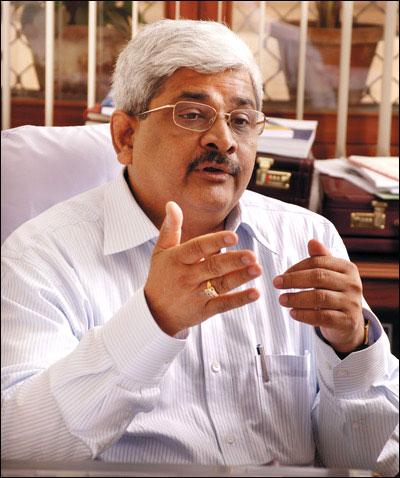
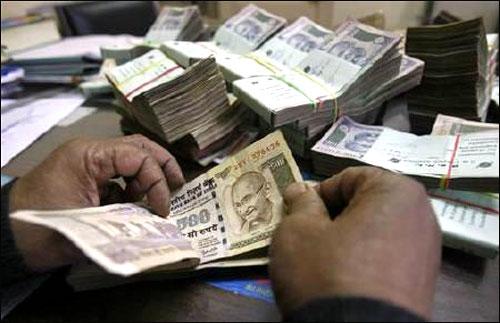
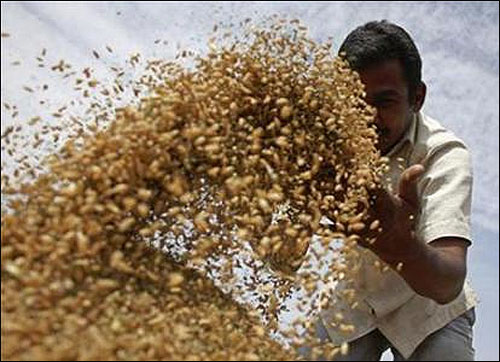
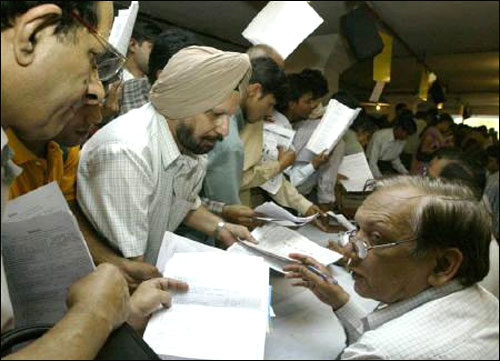

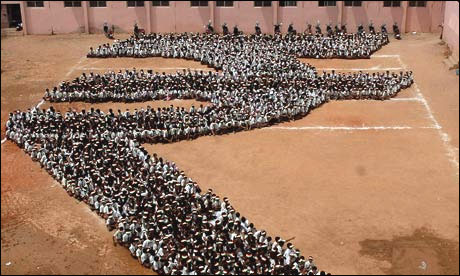
article